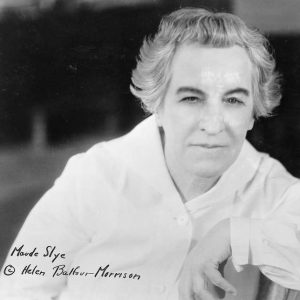Genetics Unzipped podcast: The Cancer Ladies – Maud Slye and Pauline Gross
Posted by Kat Arney, on 18 June 2020

In this episode of Genetics Unzipped, Kat Arney tells the stories of two women – one a scientist fascinated by dancing mice, the other a seamstress with a deadly family legacy – who made significant contributions to our understanding of cancer as a disease driven by genetic changes, paving the way for lifesaving screening programmes for families.
Kat’s upcoming new book Rebel Cell: Cancer, Evolution and the Science of Life, explores what we’ve learned so far about where cancer comes from, where it’s going, and how we might finally beat it. It’s coming out in the UK on the 6th of August and in the US on the 29th September – and is available now to pre-order from Amazon or your retailer of choice.
While she was researching the book, Kat came across the stories of two remarkable women who both made significant contributions to our fundamental understanding of cancer, but who have tended to be overlooked in many tellings of the history of cancer research. Here are their stories.
Born in Minnesota in 1879, Maud Slye was a cancer pathologist who dedicated her career to studying patterns of cancer inheritance in more than 150,000 mice. But as well as being a dedicated scientist (as well as a part-time poet), her ideas about eugenics brought controversy.
Even so, Slye’s work earned her a gold medal from the American Medical Society in 1914 and from the American Radiological Association in 1922. She was also awarded the Ricketts Prize from the University of Chicago in 1915 and an honorary doctorate from Brown University in 1937. She was even nominated for a Nobel prize in 1923.
Running parallel to Slye’s work in mice was the research carried out by Aldred Warthin, a doctor working at the University of Michigan in Ann Arbor. One day in 1895, a chance meeting between Warthin and a local seamstress, Pauline Gross, set the two of them off on a 25-year-long quest to understand why so many members of Pauline’s family had died from cancer at a young age.
Pauline spent years compiling detailed family histories, enabling Warthin to trace the pattern of inheritance through Family G, as it became known. Like Slye, Warthin was a fan of eugenic ideas, and his work fell out of favour after his death. Pauline’s detailed genealogy lay undisturbed in a closet in the university until the 1960s, when American doctor Henry Lynch and social worker Anne Krush rediscovered her work and continued extending and investigating Family G. Today, members of Family G – and others around the world carrying dangerous variants in mismatch repair genes – can undergo genetic testing, with a range of preventative and screening options available.
The story of Pauline and Family G, and the impact that their genetic legacy has had on the family down the generations, is beautifully told in the book Daughter of Family G, a memoir by Ami McKay.
Genetics Unzipped is the podcast from The Genetics Society. Full transcript, links and references available online at GeneticsUnzipped.com
Subscribe from Apple podcasts/iTunes, Spotify and all good podcast apps to make sure you get the latest episodes and catch up on our back catalogue.
If you enjoy the show, please do rate and review on Apple podcasts and help to spread the word on social media. And you can always send feedback and suggestions for future episodes and guests to podcast@geneticsunzipped.com Follow us on Twitter – @geneticsunzip


 (No Ratings Yet)
(No Ratings Yet)